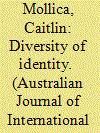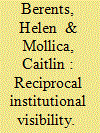|
|
|
Sort Order |
|
|
|
Items / Page
|
|
|
|
|
|
|
| Srl | Item |
| 1 |
ID:
153266


|
|
|
|
|
| Summary/Abstract |
In recent years, the transitional justice field has become increasingly concerned with ensuring meaningful participation from a wide range of actors. In response, a burgeoning scholarship has emerged, which aims to understand the interests and needs of these stakeholders, most notably women and children. Noticeably absent from this research is an examination of youth interests as distinct from children’s. Instead, the conflict identities of youth are most often conceived as inextricably tied to those of children. As a result, the narrow victim/perpetrator binary remains the dominant identity construction employed for understanding their involvement in conflict and transitional justice processes. Drawing on the case of the Solomon Islands Truth and Reconciliation Commission, this article reveals that youth are more than passive subjects in the reconciliation process. It demonstrates that the interactions of youth with truth and reconciliation commission processes allow youth to exercise agency, and thus challenge the dominance of the victim/perpetrator identity construct. The article thus proposes an alternative way of framing youth participation, whereby the identities of youth in transitional contexts are represented as diverse and malleable.
|
|
|
|
|
|
|
|
|
|
|
|
|
|
|
|
| 2 |
ID:
184041


|
|
|
|
|
| Summary/Abstract |
Within the architecture of the United Nations (UN), formal recognition of the contributions of historically marginalised individuals and communities to peacebuilding denotes a positive shift in rhetoric and practice. Alongside broader institutional moves towards ‘sustaining peace’; the emergence of a ‘Youth, Peace and Security’ agenda since 2015 formalises attention to youth as positive contributors to peacebuilding and in responding to violence. This article situates the Youth, Peace and Security agenda within broader institutional and academic attention on ‘inclusive peace’. It considers the ongoing challenges in legitimising youth inclusion; and positions this emergent agenda in relation to the gains made by the Women, Peace and Security agenda, and the establishment of the UN’s sustaining peace agenda. These explorations demonstrate the value of considering the evolution of inclusive peace agendas together, while remaining mindful of their distinctive characteristics, to better understand the potential of inclusive approaches to peace. It argues that the Youth, Peace and Security agenda should be understood as a key element of shifts in UN peacebuilding practice towards inclusivity that enable visibility and legitimacy to a broader range of peace actors. We suggest that greater recognition of the contributions of youth to the broader ‘inclusive and sustaining peace’ mandates is needed.
|
|
|
|
|
|
|
|
|
|
|
|
|
|
|
|
| 3 |
ID:
153246


|
|
|
|
|
| Summary/Abstract |
In 2012, the Solomon Islands truth and reconciliation commission (TRC) submitted its Final Report to the Solomon Islands Government. The Report detailed the underlying and proximate causes of the conflict, provided a record of the injustices perpetrated during its course, and presented a set of recommendations designed both to address the underlying sources of tension in Solomon Islands society and to guard against future hostilities. In the time that has since elapsed, however, successive Solomon Islands Governments have failed to uphold their obligations to publish the report and implement its recommendations. This article examines the reasons for this implementation gap and considers its ingoing ramifications for transitional justice and reconciliation in the Solomon Islands. It argues that the implementation gap can be attributed to a fundamental lack of political will, provoked by the TRC's decision to ‘name names,’ combined with the extremely limited economic capacity of the state. What is more, it also demonstrates that the failure to implement key recommendations has meant that the underlying causes of the conflict remain without adequate redress and that the legitimacy of the TRC and the Solomon Islands’ broader reconciliation process has been brought into serious question.
|
|
|
|
|
|
|
|
|
|
|
|
|
|
|
|
|
|
|
|
|